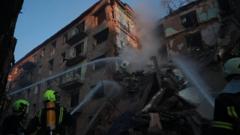In a significant diplomatic move, Russian President Vladimir V. Putin met with Iran's foreign minister on June 23, 2025, marking the first high-profile engagement between the two nations since Israel intensified its military campaign against Iran. While acknowledging Iran's plight during the ongoing conflict, Putin carefully refrained from explicitly blaming the United States or Israel for their military actions. This measured stance reflects Russia's attempt to balance its support for Iran with the need to maintain a stable relationship with Western nations.
Putin Navigates Tensions, Meets with Iran's Foreign Minister Amid Israel-Iran Conflict

Putin Navigates Tensions, Meets with Iran's Foreign Minister Amid Israel-Iran Conflict
Russian President Vladimir Putin expresses support for Iran but avoids direct confrontation with the U.S. and Israel during recent talks.
In their meeting at the Kremlin, Putin described Israel's offensive against Iran as “absolutely unprovoked aggression,” and expressed Russia’s intention to assist the Iranian populace distressed by the conflict, yet he did not make specific military or economic commitments. The Kremlin's approach aims to position Russia as a potential mediator in the escalating conflict while simultaneously fostering relationships with various regional players, including Iraq and the UAE.
Putin's call for dialogue signals an effort to bring about a resolution to the hostilities, contrasting sharply with the more aggressive rhetoric from Iran's foreign minister, Abbas Araghchi, who condemned actions by both Israel and the U.S. Kremlin Spokesperson Dmitri S. Peskov echoed Putin's sentiments of support but sidestepped questions regarding any enhancements to Iran’s defense capabilities, indicating an awareness of the delicate geopolitical landscape Russia navigates.
Overall, the interplay of diplomacy and military aggression underlines the complexities of international relations in the region, particularly as conflicting interests vie for influence and control amid the chaos of war.
Putin's call for dialogue signals an effort to bring about a resolution to the hostilities, contrasting sharply with the more aggressive rhetoric from Iran's foreign minister, Abbas Araghchi, who condemned actions by both Israel and the U.S. Kremlin Spokesperson Dmitri S. Peskov echoed Putin's sentiments of support but sidestepped questions regarding any enhancements to Iran’s defense capabilities, indicating an awareness of the delicate geopolitical landscape Russia navigates.
Overall, the interplay of diplomacy and military aggression underlines the complexities of international relations in the region, particularly as conflicting interests vie for influence and control amid the chaos of war.























